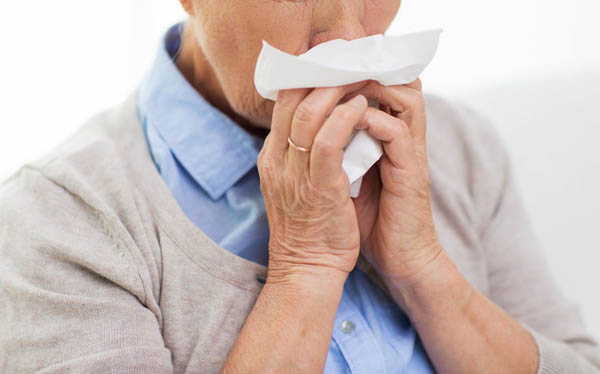
As the leaves will soon begin to fall here in upstate New York, we are approaching the start of flu season. You might remember how widespread last year’s flu epidemic was. Experts say that’s partly due to the flu shot not being as effective as it usually is. As a result, the number of people who were bitten by the flu bug was significantly higher than in previous years.
While you might think getting the flu is more of an annoyance than a serious health risk, that really isn’t the case for seniors. In a typical flu season, older adults account for as much as 85 percent of flu-related deaths and up to 70 percent of hospitalizations.
Receiving the annual flu shot is one of the best preventative measures you can take, but it’s not the only one. You can minimize your risk of catching the flu and help a senior loved one do the same by taking a few extra precautions.
5 Ways Seniors and Caregivers Can Avoid Being Bitten by the Flu Bug
1. Limit personal contact: The influenza virus passes easily from one person to another. It can be transmitted by a handshake or by being too close to someone who is sick. Limiting personal contact during flu season can help lower your odds of catching the bug.
2. Don’t touch your face: Most of us fail to realize how many times we touch our face throughout the day. Scratching your nose. Pushing hair off your face. Rubbing your eyes. If you’ve been exposed to the influenza virus and have it on your hands, your risk of getting the flu increases. Making a conscious effort not to touch your face can help limit your flu exposure.
3. Wash your hands: It’s important to practice good hand washing hygiene any time of year, but especially so during flu season. It’s easy for the virus to linger on doorknobs, handrails, and other public locations. Use hot, soapy water to scrub your hands frequently throughout the day. Keep a small bottle of alcohol-based hand sanitizer in your purse or car to use when you don’t have access to soap and warm water.
4. Get enough sleep: Sleep is an important part of a healthy lifestyle. When you don’t get enough quality sleep, your immune system becomes weaker. The body has a difficult time fighting off viruses when the immune system isn’t at its best. Health professionals say most adults need between 7 and 9 hours of sleep each night.
5. Eat a healthy diet: A healthy diet is another necessity when it comes to keeping the immune system strong. If you or a senior loved one is exposed to the flu, you’ll have better luck fighting it off when your immune system is pumped up.
One final tip is to be on guard for early signs of the flu. Despite your best prevention efforts, you might come down with the flu. Call your physician when the first flu symptoms appear. There are prescription antiviral drugs that might help lessen the severity of your symptoms and shorten the length of time you are sick, but they must be taken at the very earliest stages of the flu.
The Wesley Community is Committed to Senior Health
At The Wesley Community, we are committed to the health and wellness of older adults in the Saratoga Springs area. That includes sharing resources family caregivers need to feel confident in their role. We encourage you to bookmark our “Senior Strategies” page and stop back often to stay updated on the latest research and news.

